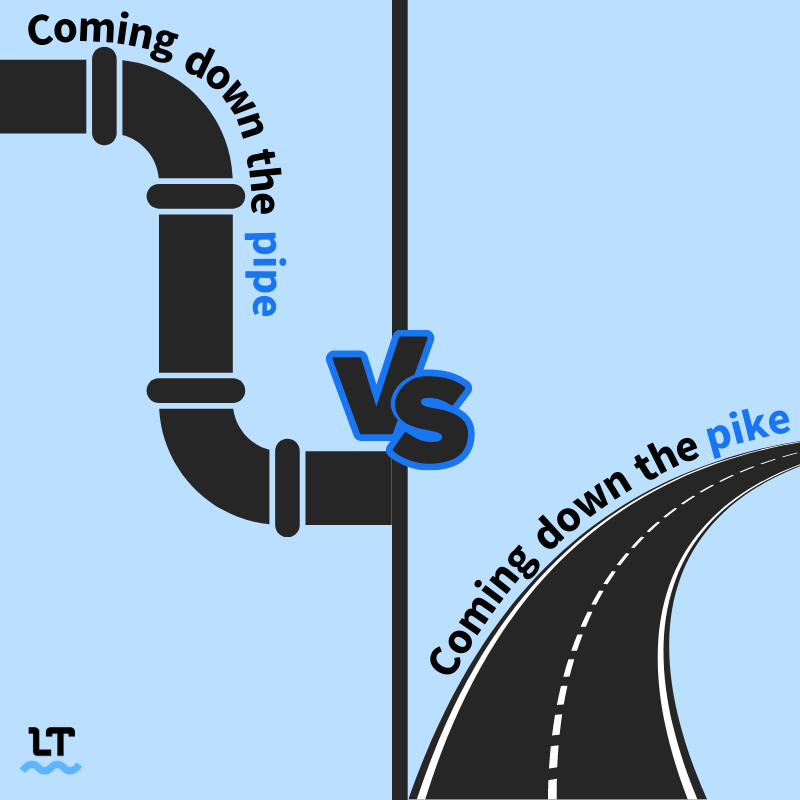“Pike” or “Pipe”: Quick Summary
Coming down the pike is the original and correct version of the phrase, which nowadays usually refers to something that is “happening or appearing in the future.” Coming down the pipe is a modified version of the phrase that carries the same meaning and is gaining popularity.
- Although I’ve been training hard, I’m nervous about what’s coming down the pike.
Table of Contents
Is It Coming Down the “Pike” or “Pipe”?
What Does “Down the Pike” Mean?
Where Did “Coming Down the Pipe” Come From?
Is It “Coming Down the Pike” or “Pipe”?
The correct expression is coming down the pike, which means “to happen or appear in the near future.” If you’re certain you heard someone say coming down the pipe, it’s because they probably did say it. This phrase has gained some prominence, likely because people are unfamiliar with the meaning of the term pike.
Below, we’re going to elaborate on the meaning and origin of coming down the pike, provide synonyms, and explain why some people say coming down the pipe instead.

What Does “Down the Pike” Mean?
Originally, down the pike was synonymous with in the course of events, which is a noun phrase defined by Merriam-Webster Dictionary as “the things that have happened, that are happening, or that will happen.”
It’s important to remember the lessons learned from the challenges that have come down the pike.
=
It’s important to remember the lessons learned from the challenges that have happened.
To understand the origin of this phrase, you should know that pike is a shortened version of the word turnpike, which initially referred to major roads on which payments were collected from drivers at toll booths or gates.
Turnpikes often connected cities to small towns and brought legions of unexpected things like visitors, commodities, and opportunities. So, using the phrase down the pike to refer to the flurry of possibilities that can happen or are happening makes sense.
I’m amazed by all the goods that are coming down the pike.
She never would have expected so many nomads to come down the pike and call this place their home.
In its more recent usage, down the pike focuses on “what is expected to happen in the near future.”
My imagination keeps churning out ideas, so many good books are coming down the pike.
He asked me about the project and if any new developments were coming down the pike.
I sat and imagined all the things that could come down the pike if I just focused hard enough.
Where Did “Coming Down the Pipe” Come From?
It can be presumed that coming down the pipe came to be because some people weren’t familiar with the term pike. It’s used in the same sense to refer to something that will occur at some future point.
The department got a budget increase, so there are a lot of new and exciting things coming down the pipe.
We have planned and saved for this for over five years. There are lots of travel plans coming down the pipe.
We’re getting married soon, so I can’t help but think of all the beautiful, major life events that will surely come down the pipe.
According to this Google Ngram coming down the pipe is not nearly as popular as coming down the pike, but it’s also not completely irrelevant.

There’s another English idiom that may have something to do with the confusion: in the pipeline. This expression means “being planned, developed, or completed.” Its reference to something that is in the process of being completed might be why many people say coming down the pipe.
So, Which Phrase Should You Use?
The fact is that both coming down the pike and coming down the pipe can be used to refer to things “that have happened, that are happening, or that will happen.” But if you prefer to use etymologically accurate vocabulary, then stick to using the original version.
Keep in mind that these phrases are typically used to refer to things that will happen or appear in the future. You can also play it safe by using these synonyms:
ImminentI’m certain the awards are coming down the pike.
I’m certain the awards are imminent.In the works
We have a lot of new and exciting programs coming down the pipe.
We have a lot of new and exciting programs in the works.On the horizon
You won’t believe all the new features that are coming down the pike.
You won’t believe all the new features that are on the horizon.On the way
She’s been working hard and says a great album is coming down the pipe.
She’s been working hard and says a great album is on the way.Upcoming
The band announced a tour was coming down the pike.
The band announced an upcoming tour.
Pristine Writing is Coming Down the Pike
Remember: although coming down the pike is the original and technically correct version of the phrase, coming down the pipe is gaining popularity and acceptance.
If you want pristine writing coming down the pike for you at all times, make sure to use LanguageTool as your advanced spelling, grammar, and punctuation checker. Not only can it correct various types of errors, but it can also assist you in learning common phrases and colocations through its paraphrasing feature, which can help rewrite your sentences to be more formal, fluent, simple, or concise. Plus, it supports over 30 languages.
Give it a try today!

